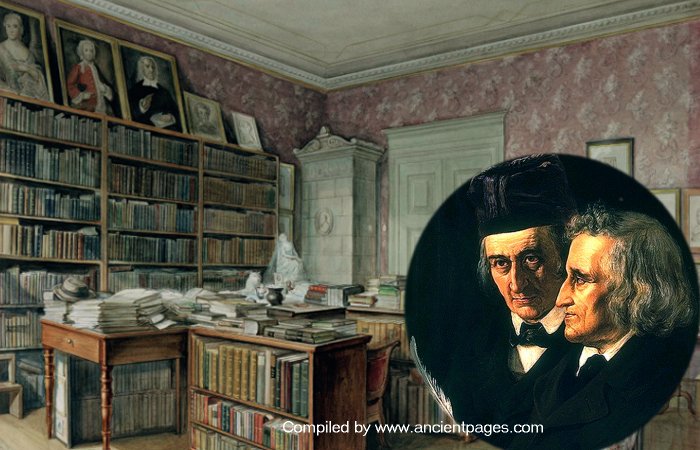Jan Bartek - AncientPages.com - The Brothers Jacob and Wilhelm Grimm were two German scholars renowned for their contributions to folklore and linguistics. While they are best known for their collection of fairy tales, Kinder- und Hausmärchen (1812–22), which is commonly referred to as Grimm's Fairy Tales in the English-speaking world, their work had a profound impact on the modern study of folklore.
Brothers Grimm portrayed by Elisabeth Jerichau-Baumann (1855)- Credit: Public Domain
Beyond their famous fairy tales, the Grimm brothers dedicated most of their lives to developing Germanic philology, the study of the historical linguistics of the Germanic languages. Their extensive research and scholarly efforts in this field made them two of the most significant German academics of their time.
Recent discoveries of previously lost books from their private library have the potential to provide valuable insights and aid further research into the Grimm brothers' extensive body of work, offering new perspectives on their contributions to the fields of folklore and linguistics, PAP informs.
Professor Eliza Pieciul-Karminska from the Faculty of Modern Languages at Adam Mickiewicz University and Renata Wilgosiewicz-Skutecka from the University Library found 27 books written by the Grimm Brothers while searching through the library of the University of Adam Mickiewicz in Poznań. These valuable books were considered lost after World War II.
"The volumes found in the University Library in Poznan from the private collection of the Brothers Grimm, which had been considered lost since the end of World War II, can significantly contribute to the development of contemporary Grimm research and also give hope that the collections also contain other - considered for missing items - items from Jacob and Wilhelm's private library," the researchers wrote in an article published in the university magazine "Biblioteka."
The researchers highlight that despite their legal education, the Brothers Grimm immersed themselves in studying language history, recognizing them as pioneers of Germanic philology. Their dedication to this field was unwavering, as evidenced by their extensive efforts in collecting ancient printed materials, manuscripts, and books spanning diverse subjects and languages. This comprehensive research formed the cornerstone of their groundbreaking contributions to the field.
The Brothers Grimm not only collected books but also worked on them - and with them. "The Grimms treated their library primarily as a work tool, which is why they left in books - even in the rarest old prints - traces of their careful reading: underlining, annotations and markings, sometimes even with a pin," the researchers wrote.
The scientists’ article provides insightful information about the valuable notes found in books from Poznan, which were made by Jakub and Wilhelm Grimm. These notes highlight characters, places, and longer excerpts of interest to researchers.
The writing room of Jacob Grimm. Credit: Deutsche Digitale Bibliothe
Jacob often created lists of marked fragments on the back endpapers, including proper names and corresponding page numbers. The researchers emphasize that these annotations hold great significance for studying the Grimms' legacy, as they offer insights into their working methods and the selection of motifs, particularly in fairy tales.
To explore this aspect further, the article suggests the need for collaborative German-Polish research to describe and analyze these notes in detail.
Wilhelm and Jacob's private library collections encompassed an impressive 8,000 volumes over their 60-year literary careers. In Germany, the Grimm brothers' book collection is treated as a distinct research subject and exhibited at the Berlin library in a shape as close as possible to the book collection that Jacob and Wilhelm used during their lives. Ludwig Denecke prepared the catalog of works.
According to the article, some of these books may have found their way to the University Library in Poznan after World War II due to the movement of library collections during and after the war.
Credit: UAM
However, it was also established that a secondary route facilitated the transfer of some volumes from Berlin (including the Grimm brothers' book collection) to Poznan. Specifically, in 1898–1899, two books were transferred to the newly established Kaiser-Wilhelm-Bibliothek in Poznan as duplicates from the Königliche Universitätsbibliothek in Berlin. Subsequently, in 1919, the newly founded University of Poznan acquired these collections, forming the foundation of the book collection at the University Library in Poznan.
The discovery of numerous lost books by the Brothers Grimm is undoubtedly a significant development for scholars and enthusiasts of folklore studies. These rediscovered works offer invaluable insights into the rich tapestry of cultural narratives and oral traditions, providing researchers with fresh perspectives and source materials to deepen their understanding of this captivating field.
Written by Jan Bartek - AncientPages.com Staff Writer
